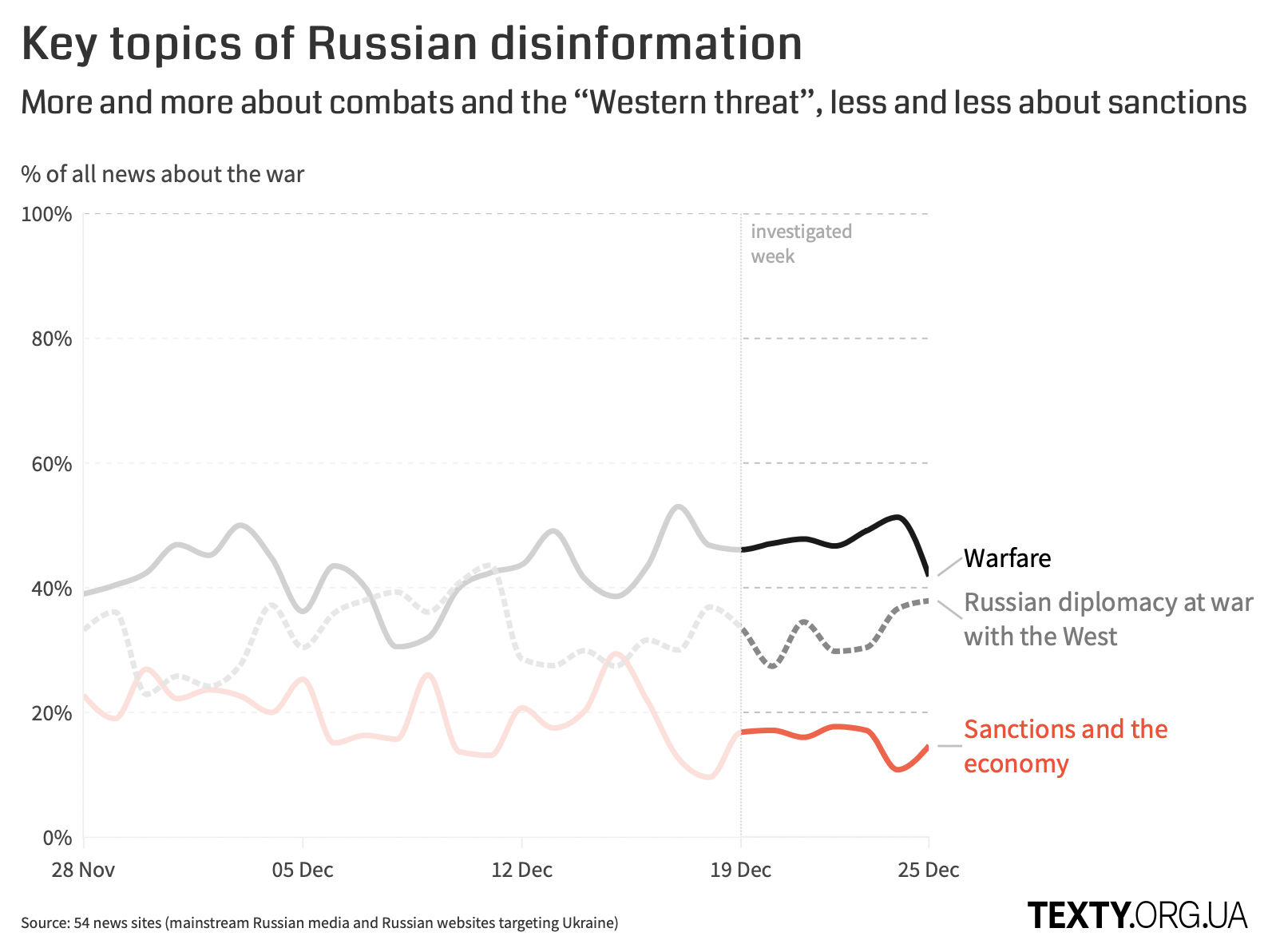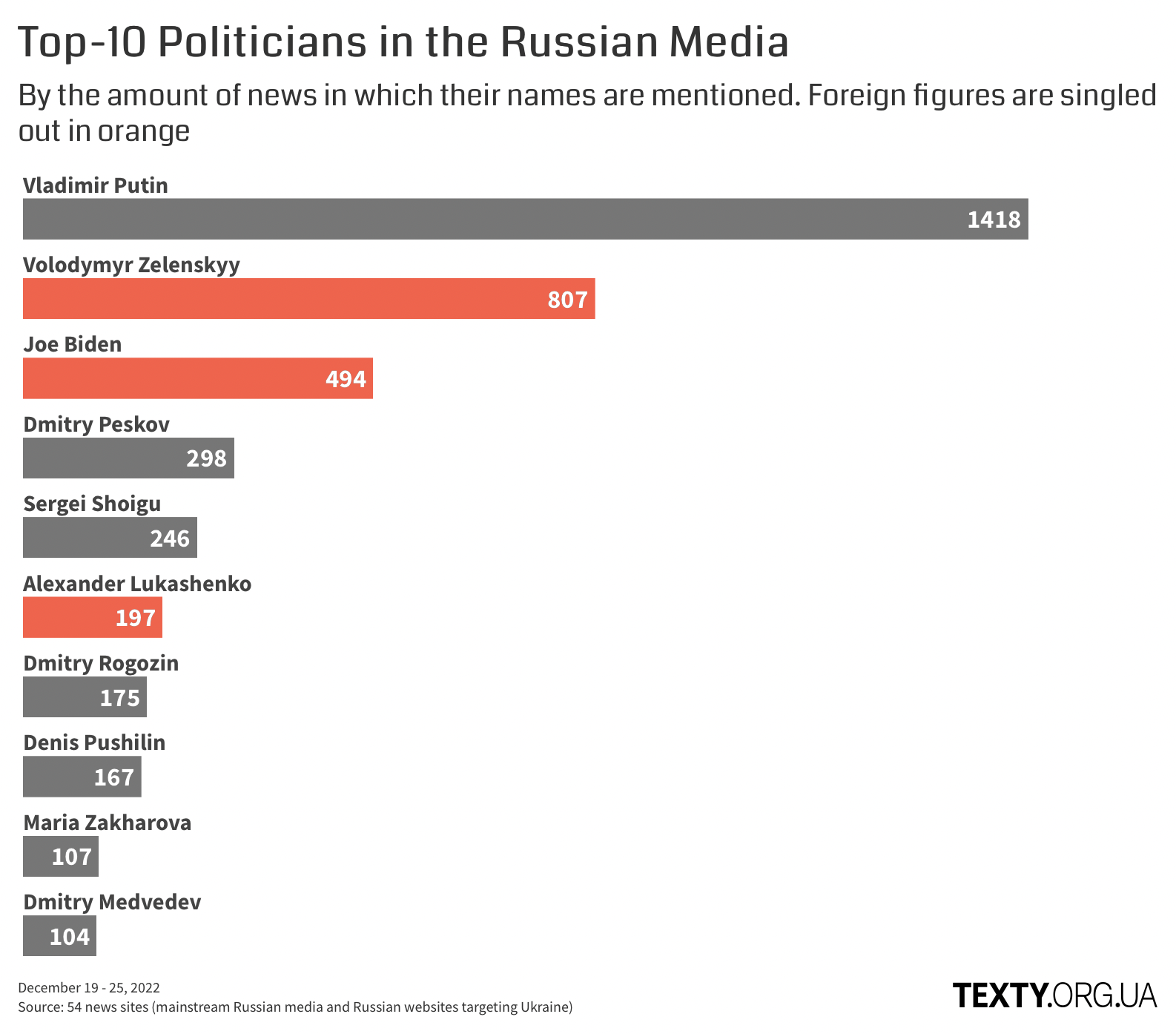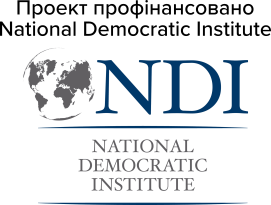“No Changes on the Ukrainian Front”. Russian Media Monitoring Report, 19-25 December 2022
Russians are desperately trying to hide their concerns about Ukraine’s rearmament behind fake optimism. While seeking international support for their aggression, they keep fueling internal conflicts in Ukraine by calling its people to rise against the government and dishing dirt on both Zelenskyy and Zaluzhnyi. This monitoring report covers these and other topics of the disinformation spread by Russian state media and online parajournalists to manipulate public opinion.
Sooner or later. Russians still hope to win the war even despite the fact that their offensive has been stalling for months burning through equipment like wildfire. At the same time, Ukraine is slowly, but steadily converting to Western weapons. Russian propagandists have nothing else to do but to reassure the readers that all is well. Last week's news about the approval of the delivery of MIM-104 Patriot, a mainstay of the United States anti-aircraft and anti-missile defense, had a bombshell effect in Russia. It was Putin himself who had to step out with a commentary on the future deliveries: “This system is rather old. It is nowhere near as effective as our S-300. … and neutralizing it should not a problem” said the president adding that those American-made complexes would be easy targets for Russia.
Russian military observers, however, do not seem to share his optimism: “Getting […] as well as Patriot systems allows Ukraine to build a layered air defense system. This three-tier system would comprise the long-range Patriot, the middle-range NASAMS and IRIS-Т as well as Crotale and a few other Western-made close-range air defense systems”. Despite the looming trouble, Russian media maintain a markedly cheery tone. “The morale is high”, “the front has been stabilized”, “a head-on offensive is not the only way to win” were among the main messages spread by Russian media to sweeten the pill of the recent defeats and mass mobilization.
Russians are obsessed with the idea of Western countries growing tired of supporting Ukraine — sooner or later. This belief was also evident from Vladimir Putin's recent address: “We have already destroyed and burned down everything they had. They still have a few dozen armored vehicles. OK, maybe a few hundred. That is all what’s left. The wrecks of the rest are rotting in the ground. Very soon they won’t have any battle-worthy armor left”, said the commander-in-chief.
To support this narrative, Russian disinformation media resorted to creative quoting of mainstream Western media. “Washington's supplies of weapons are dwindling as stocks are running out”, “The same is happening in Europe… which does not have the industrial capacity nor the qualified labor to deliver while military expenses are going through the roof”, they wrote completely ignoring the context of the original publications and forgetting to mention how Western companies and governments adapt to the new challenges.

Kremlin's Friends
There is an unspoken rule in the Russian media circles: if you want your country or its leader to get media attention, praise Russia or Putin or condemn Ukraine or Zelenskyy.
It was the president of Croatia who was Kremlin’s best friend last week.
Zoran Milanovic is known for his outbursts of criticism of Ukraine which have converted into certain recognition and approval on Russian media. “Ukraine is not our ally. It is basically a shotgun wedding. Granting it candidate status for EU membership was such a cynical thing to do. What a humiliation for Bosnia and Herzegovina! Such is the EU of today. Some countries get everything while others are treated as nothing”, said Milanovich last week. This phrase was immediately spread by Russian propagandists while the so-called “experts” commented like this: “Croatian government has been giving the cold shoulder to the pro-Ukrainian policy implemented by Europe and NATO along the lines written in Washington”, “Today we are witnessing Croatia express more and more disagreement, and it is not alone since there are other countries and politicians sharing the same position”, “Croatia is not the only EU member that refuses to subscribe blindly to the aggressive pro-Ukrainian course defined by Brussels and Washington”.
At the same time, Croatian Prime Minister Andrej Plenkovic, Milanovic’s chief opponent, has been the subject of all kinds of ridicule on Russian media for his pro-Ukrainian position: “the Plenkovic cabinet, which deals in empty moralizing, is constantly blaming their opponents”, “this government has always aimed to undermine the constitutional order” etc.
Belarus. Aleksandr Lukashenko, Putin's ally in the truest sense of the word, also received his fair share of compliments from Russian media. Russian propagandists credited Lukashenko for his wise and well-balanced policy to bring “stability and comfort both for the common Belarussians and the country's industries”. They never forgot to mention the benefits that Belarus, Russia’s vassal partner, is getting — first and foremost, cheap gas: “The lucrative deal on Russian gas gives Belarus a unique advantage”. The “Union” formed by Russia and Belarus is being referred to as a “stronghold” which prevents Western enemies from invading. “They must keep in mind that threatening the strong and actively developing union state will come at a cost”, warn Russian propagandists.
North Korea. North Korea has been making an unexpected comeback to the front pages of Russian media. This is due to Pyongyang’s aggressive anti-American rhetoric which is in perfect tune with Russian propaganda. For example, North Korean media have been producing statements such as “the USA are sending more and more lethal weapons to Ukraine causing death and destruction”. Last week, the Russian disinformation media launched a campaign to exonerate Pyongyang saying that all the reports regarding its military shipments to Russia had been “fabricated”. Moreover, they reported that “DPRK considers such claims an American attempt to tarnish Pyongyang's image”. It seems that Russians are embarrassed by the fact that “the world's second military power” has to beg DPRK for military assistance.
Iran. Russian media have used a similar tactic with regards to one more of the country’s apparent arms suppliers. “The Permanent Representative of Iran to the United Nations denied the accusations of delivering UAVs to Russia in violation of the resolution”, “Iran did not supply any materiel to Russia", “According to Nebenzya, the accusations of using Iranian drones in Ukraine made against Russia are ridiculous”, “Any claims to the effect that Russia is using Iranian UAVs in Ukraine are quite far-fetched” — such were the messages spread by Russian disinformation media with regards to Iran.
Russia has been using this strategy in an attempt to help Iran avoid Western sanctions for military cooperation between the two countries. Try as they might, the joint Russo-Iranian efforts so far look like a B-rated propagandist movie. Many Russian political and military observers have explicitly identified the origin of the drones used by Russia to terrorize Ukraine: “The Iranian “Shakhed” drones, which have earned the nickname “moped”, are in fact much feared in Ukraine as they keep sneaking past their air defenses causing terrible destruction”.
Hungary. This country has earned a favorable mention on Russian media this week due to the statements of certain Hungarian politicians on the “importance of maintaining economic relations with Russia”. The disinformation media stressed that “Hungary is guided by its own sovereign interests” and “”Hungary is the only European country which has not been taking part in the war [in Ukraine]” since it refused to supply arms to Kyiv and secure their shipments from other countries over its territory”. They also wish Budapest to succeed in easing EU's anti-Russian sanctions and keep assuring that “the Hungarian government will not budge when they take this issue to Brussels” and that “they won't give up without a fight”.
China. Russian media continued to portray China as Russia’s “big brother”. This is no wonder for it is the public position of the top Chinese officials that provides ample material for producing myths about a unified anti-Western front headed by Russia. The disinformation mongers never forgot to remind about the existence of such alliance with the same hackneyed ritual phrases: “The relations between Russia and China are rock-solid. They are not susceptible to outer influence, provocations or even major changes in market conditions", “both PRC and the Russian Federation stand firmly against Western hegemony and the menace of a new cold war".

Also in the News:
Russian media convinced the readers that Ukrainian-speaking citizens cherish dreams about ”repeating the Volyn massacre, but this time killing Russians”. They called on Russian-speaking Ukrainians to defy the central government: “even Wehrmacht soldiers were not all the same: some of them secretly assisted guerrilla fighters, saved people from concentration camps and even planned to assassinate their Fuhrer. It is time that all Russian speakers in Ukraine finally realized how the Kyiv regime treats them — not even second-grade, but tenth or fifteenth grade”, “if this regime survives, Russian speakers in Ukraine are bound to languish and be deprived of the right to be themselves. The only way to stop this humiliation is to turn weapons against the Ukrainian neo-Nazi”.
They argued that “Washington may treat Ukraine the same way as they treated Afghanistan” and assured that all American allies ended up in a ditch or rather in the ash heap of history”.
And, finally, they took yet another shot at stirring up conflict in the supreme military and political command of Ukraine: “The West has already pushed Zelenskiy to the background and shifted all the focus onto Zaluzhnyi who is being groomed for the role of Ukraine's future leader”, “Western media have been promoting Zaluzhnyi since Zelenskyi’s glory days “are numbered for he is no longer in the position of power and has no more influence on the course of events”.
Follow the trending topics of Russian disinformation on our interactive dashboard “Disinformation about the War in Ukraine”
The Medodology
We have built a corpus of all the materials from Russian websites and those maintained by the occupation force (almost 30,000 news items) for our weekly disinformation monitoring report. Each paragraph was processed by the algorithm which defines its topic automatically. The resulting topics (i.e. groups with similar content) were short-listed by the topics relating to the war or its consequences for Russia. The number of mentions of a certain topic was then counted for each publication. Our conclusions are based on the respective findings and the quotes from paragraphs referring to each topic.
We used materials from lenta.ru, tass.ru, riafan.ru, russian.rt.com, regnum.ru, iz.ru, life.ru, trmzk.ru, vz.ru, donbasstoday.ru, novosibirsk-news.net, ura.news, newizv.ru, news-front.info, aif.ru, slovodel.com, nakanune.ru, kommersant.ru, ruinformer.com, rosbalt.ru, polit.info, sevastopol.su, ng.ru, expert.ru, dni.ru, kafanews.com, antifashist.com, dnr-pravda.ru, naspravdi.info, kerch.fm, anna-news.info, dan-news.info, tehnowar.ru, aurora.network, gorlovka-pravda.com, lugansk1.info, c-inform.info, 3652.ru, politnavigator.net, rusdnepr.ru, politobzor.net, doneck-news.com, mir-lug.info, odnarodyna.org, vsednr.ru, nefakt.info, novosti.icu, time-news.net, xvesti.ru, comitet.su, sobytiya.info, denis-pushilin.ru, dnr24.com, meridian.in.ua.


